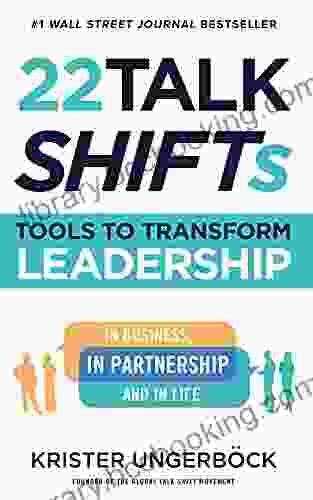Tools to Transform Leadership in Business, Partnership, and Life

Leadership is a critical skill for success in any field. Whether you're leading a team at work, a relationship, or your own life, the ability to inspire and motivate others is essential.
But what does it take to be an effective leader? What tools and skills do you need to succeed?
In this comprehensive guide, we'll explore the essential tools you need to transform your leadership in business, partnership, and life. We'll cover everything from communication and conflict resolution to emotional intelligence and strategic thinking.
4.5 out of 5
| Language | : | English |
| File size | : | 1892 KB |
| Text-to-Speech | : | Enabled |
| Screen Reader | : | Supported |
| Enhanced typesetting | : | Enabled |
| X-Ray | : | Enabled |
| Word Wise | : | Enabled |
| Print length | : | 204 pages |
| Lending | : | Enabled |
By the end of this guide, you'll have the tools and knowledge you need to become a more effective leader and achieve your goals.
Communication is the foundation of effective leadership. It's how you share your vision, motivate your team, and resolve conflict.
There are three main types of communication: verbal, nonverbal, and written.
- Verbal communication is what you say. It includes your tone of voice, your choice of words, and your body language.
- Nonverbal communication is what you do. It includes your facial expressions, your gestures, and your posture.
- Written communication is what you write. It includes emails, memos, and reports.
All three types of communication are important for effective leadership. You need to be able to communicate clearly and effectively in all situations.
Here are some tips for effective communication:
- Be clear and concise. When you're communicating, make sure your message is clear and easy to understand. Avoid using jargon or technical terms that your audience may not be familiar with.
- Be respectful. Always be respectful of your audience, even if you disagree with them. Avoid using insults or derogatory language.
- Be empathetic. Try to understand the perspective of your audience. This will help you communicate in a way that is relevant and meaningful to them.
- Be authentic. Be yourself and don't try to be someone you're not. People will appreciate your authenticity and be more likely to trust you.
Conflict is a natural part of life. It can occur in any relationship, including those between leaders and their followers.
When conflict occurs, it's important to resolve it quickly and effectively. If you don't, it can damage relationships and harm your team's productivity.
Here are some tips for effective conflict resolution:
- Acknowledge the conflict. The first step to resolving conflict is to acknowledge that it exists. Don't ignore it or pretend that it's not there.
- Identify the source of the conflict. Once you've acknowledged the conflict, you need to identify the source of it. This will help you develop a plan for resolving it.
- Communicate with the other person. Once you know the source of the conflict, you need to communicate with the other person involved. Explain your perspective and listen to theirs.
- Be willing to compromise. In most cases, you won't be able to get everything you want. Be willing to compromise to reach a resolution that both parties can live with.
- Follow up. Once you've resolved the conflict, follow up with the other person to make sure that the issue has been resolved.
Emotional intelligence is the ability to understand and manage your own emotions, and to understand and respond to the emotions of others.
Emotional intelligence is a critical skill for effective leadership. It helps you to:
- Motivate yourself and others. When you're emotionally intelligent, you can understand your own motivations and the motivations of others. This helps you to inspire and motivate your team to achieve their goals.
- Resolve conflict effectively. When you're emotionally intelligent, you can understand and respond to the emotions of others. This helps you to resolve conflict quickly and effectively.
- Build strong relationships. When you're emotionally intelligent, you can build strong relationships with your team members, colleagues, and customers.
Here are some tips for developing your emotional intelligence:
- Pay attention to your emotions. The first step to developing your emotional intelligence is to pay attention to your emotions. Notice how you're feeling and why you're feeling that way.
- Understand your emotions. Once you've noticed your emotions, you need to understand them. What are they telling you? What do you need to do to address them?
- Manage your emotions. Once you understand your emotions, you need to manage them. This doesn't mean suppressing them or pretending they don't exist. It means finding healthy ways to express and manage them.
- Empathize with others. The final step to developing your emotional intelligence is to empathize with others. This means understanding their emotions and perspectives.
Strategic thinking is the ability to think long-term and make decisions that will benefit your organization in the future.
Strategic thinking is a critical skill for effective leadership. It helps you to:
- Make better decisions. When you're strategic, you can think through the long-term consequences of your decisions. This helps you to make better decisions that will benefit your organization in the future.
- Set goals and objectives. When you're strategic, you can set goals and objectives that are aligned with your organization's long-term vision. This helps you to focus your efforts and achieve your goals.
- Manage change. When you're strategic, you can anticipate change and develop strategies to manage it. This helps you to keep your organization moving forward in a changing world.
Here are some tips for developing your strategic thinking skills:
- Think long-term. When you're making decisions, think about the long-term consequences. Don't just focus on the immediate gratification.
- Consider all of your options. When you're making decisions, consider all of your options. Don't just choose the first option that comes to mind.
- Analyze the risks and benefits. Once you've considered all of your options, analyze the risks and benefits of each option. This will help you make the best decision for your organization.
- Be flexible. The world is constantly changing, so you need to be flexible in your thinking. Be willing to adapt your plans as needed.
Leadership is a challenging but rewarding role. By developing the tools and skills described in this guide, you can become a more effective leader and achieve your goals.
Remember, leadership is a journey, not a destination. There will be ups and downs along the way. But if you stay committed to your development, you will reach your destination and become the leader you were meant to be.
4.5 out of 5
| Language | : | English |
| File size | : | 1892 KB |
| Text-to-Speech | : | Enabled |
| Screen Reader | : | Supported |
| Enhanced typesetting | : | Enabled |
| X-Ray | : | Enabled |
| Word Wise | : | Enabled |
| Print length | : | 204 pages |
| Lending | : | Enabled |
Do you want to contribute by writing guest posts on this blog?
Please contact us and send us a resume of previous articles that you have written.
 Book
Book Novel
Novel Page
Page Chapter
Chapter Text
Text Story
Story Genre
Genre Reader
Reader Library
Library Paperback
Paperback E-book
E-book Magazine
Magazine Newspaper
Newspaper Paragraph
Paragraph Sentence
Sentence Bookmark
Bookmark Shelf
Shelf Glossary
Glossary Bibliography
Bibliography Foreword
Foreword Preface
Preface Synopsis
Synopsis Annotation
Annotation Footnote
Footnote Manuscript
Manuscript Scroll
Scroll Codex
Codex Tome
Tome Bestseller
Bestseller Classics
Classics Library card
Library card Narrative
Narrative Biography
Biography Autobiography
Autobiography Memoir
Memoir Reference
Reference Encyclopedia
Encyclopedia Terrence Real
Terrence Real M L Rose
M L Rose Rick Geary
Rick Geary Misti Kenison
Misti Kenison Shayna Oliveira
Shayna Oliveira Sonja K Foss
Sonja K Foss Sandra Lawrence
Sandra Lawrence Oonagh Shanley Toffolo
Oonagh Shanley Toffolo Zeena Shah
Zeena Shah Louis Wain
Louis Wain Sarah Abbondio
Sarah Abbondio Tessa Boase
Tessa Boase Roy Thomas
Roy Thomas Olivier Dunrea
Olivier Dunrea Ralph A Rossum
Ralph A Rossum Quentin Blake
Quentin Blake Steven Hugg
Steven Hugg Krystal A Sital
Krystal A Sital Sean Iddings
Sean Iddings Piri Halasz
Piri Halasz
Light bulbAdvertise smarter! Our strategic ad space ensures maximum exposure. Reserve your spot today!

 Roberto BolañoUnlock the Power of Lean for Small and Medium-Sized Manufacturing Enterprises
Roberto BolañoUnlock the Power of Lean for Small and Medium-Sized Manufacturing Enterprises
 J.R.R. Tolkien17 Timeless Projects Full Size Clothing Patterns: Elevate Your Wardrobe with...
J.R.R. Tolkien17 Timeless Projects Full Size Clothing Patterns: Elevate Your Wardrobe with... W. Somerset MaughamFollow ·19.9k
W. Somerset MaughamFollow ·19.9k Brayden ReedFollow ·12.6k
Brayden ReedFollow ·12.6k Corey HayesFollow ·8.2k
Corey HayesFollow ·8.2k Dwayne MitchellFollow ·9.5k
Dwayne MitchellFollow ·9.5k Lord ByronFollow ·9.1k
Lord ByronFollow ·9.1k Trevor BellFollow ·17.2k
Trevor BellFollow ·17.2k Forrest BlairFollow ·13.6k
Forrest BlairFollow ·13.6k Manuel ButlerFollow ·18.8k
Manuel ButlerFollow ·18.8k

 Brian Bell
Brian BellExploring The Natural World Through Mindful Expressive...
Unleash the...

 David Baldacci
David BaldacciJourney into the Enigmatic World of "Grass" by Sheri S....
Prepare to be captivated by "Grass," a...

 Dashawn Hayes
Dashawn HayesBusting Myths About Human Nature: Unraveling the Complex...
Challenging the...

 Ernest Hemingway
Ernest HemingwayNotes on Suicide: A Profound Exploration of the...
Suicide, a taboo subject shrouded in...
4.5 out of 5
| Language | : | English |
| File size | : | 1892 KB |
| Text-to-Speech | : | Enabled |
| Screen Reader | : | Supported |
| Enhanced typesetting | : | Enabled |
| X-Ray | : | Enabled |
| Word Wise | : | Enabled |
| Print length | : | 204 pages |
| Lending | : | Enabled |












